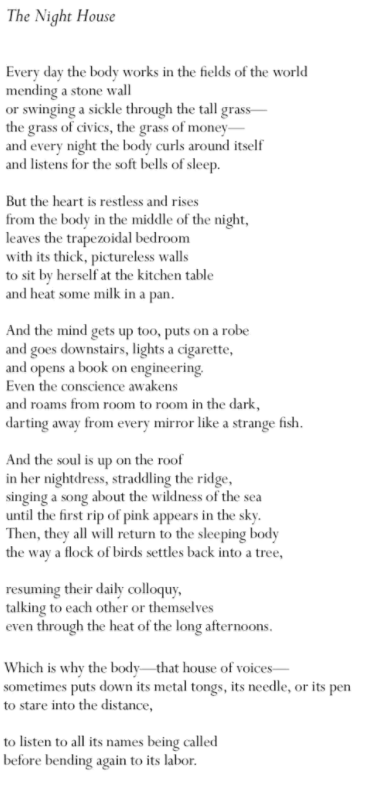- Facebook32
- Twitter1
- Total 33
Thanks to my friend Sterling Speirn, here is a wise poem about the relationship between the private life and the public life (“the grass of civics, the grass of money”). It’s by Billy Collins.

Collins interprets civic and economic life as work, presumably in the dignified, creative sense of that word. It’s the use of tongs, needles, and pens. Meanwhile, the inner life has many aspects and they like to spend a little time by themselves, not working. They are “voices”–the soul even sings–but they can be quiet, too.
The self is free at night and works all day. But the voices that dominate our dreams talk “to each other or themselves / even through the heat of a long afternoon,” and sometimes they interrupt our work to demand attention.
Some online commentators presume that the narrator is female. I’m not sure about that. The body is “its,” and its heart and soul are “she’s.” The mind has no gendered pronouns. The author’s name is “Billy.” I’m inclined to think that the gender is multiple.
Yarbough (2011) notes that Collins uses prominent phrases from very famous 20th-century American poems–such anthologists’ favorites as Frost’s “Mending Wall,” Eliot’s “Prufrock,” Bishop’s “the Fish,” and Stevens’ “The Idea of Order at Key West.” Yarbough suggests that Collins wants to depict the self as a conversation. I would add that this internal discussion involves strong, possibly overbearing characters. It’s because we have all these famous voices in our heads that sometimes we have to put down our tools “to stare into the distance, / to listen to all its names being called.”
(Scott D. Yarbrough (2011) “Poetic Allusions in Billy Collins’s The Night House,” The Explicator, 69:1, 35-37) See also: introspect to reenchant the inner life; the importance of the inner life to moral philosophy; and a poem should.